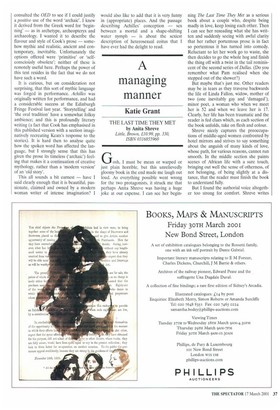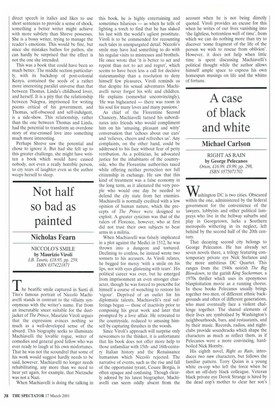A managing manner
Katie Grant
THE LAST TIME THEY MET by Anita Shreve Little, Brown, £10,99, pp. 330, ISBN 0316855960 Gosh, I must be mean or warped or just plain horrible, but this unrelieveclly gloomy book in the end made me laugh out loud. As everything possible went wrong for the two protagonists, it struck me that perhaps Anita Shreve was having a huge joke at our expense. I can see her begin ning The Last Time They Met as a serious book about a couple who, despite being madly in love, keep losing each other. Then I can see her rereading what she has written and suddenly seeing with awful clarity that her rather portentous prose is in fact so portentous it has turned into comedy. Reluctant to let her work go to waste, she then decides to go the whole hog and finish the thing off with a twist in the tail reminiscent of the second series of Dallas. (Do you remember what Pam realised when she stepped out of the shower?)
But maybe that's just me. Other readers may be in tears as they traverse backwards the life of Linda Fallon, widow, mother of two (one inevitably gay and `damaged'), minor poet, a woman who when we meet her is 52 and when we leave her is 17. Clearly, her life has been traumatic and the reader is fed clues which, as each section of the book unfolds, take on flesh and colour.
Shreve nicely captures the preoccupations of middle-aged women confronted by hotel mirrors and strives to say something about the anguish of many kinds of love, whose path, for various reasons, cannot run smooth. In the middle section she paints scenes of African life with a sure touch, bringing out well the sense of otherness, of not belonging, of being slightly at a distance, that the reader must finish the book to understand fully.
But I found the authorial voice altogether too strong for comfort. Shreve writes direct speech in italics and likes to use short sentences to provide a sense of shock, something a better writer might achieve with more subtlety than Shreve possesses. She is a bossy writer, trying to manage the reader's emotions. This would be fine, but since she mistakes bathos for pathos, she can hardly be surprised that the effect is not the one she intended.
This was a book that could have been so much better. The middle section particularly, with its backdrop of post-colonial Kenya, contained the seeds of a rather more interesting parallel universe than that between Thomas, Linda's childhood lover, and herself. It is a pity that the relationship between Ndegwa, imprisoned for writing poems critical of his government, and Thomas, self-obsessed and self-indulgent, is a side-show. This relationship, rather than the one between Thomas and Linda, had the potential to transform an overdone story of star-crossed love into something much more interesting.
Perhaps Shreve saw the potential and chose to ignore it. But had she felt up to this greater challenge, she might have written a book which would have caused nobody, not even a really horrible person, to cry tears of laughter even as the author weeps herself to sleep.



































































 Previous page
Previous page